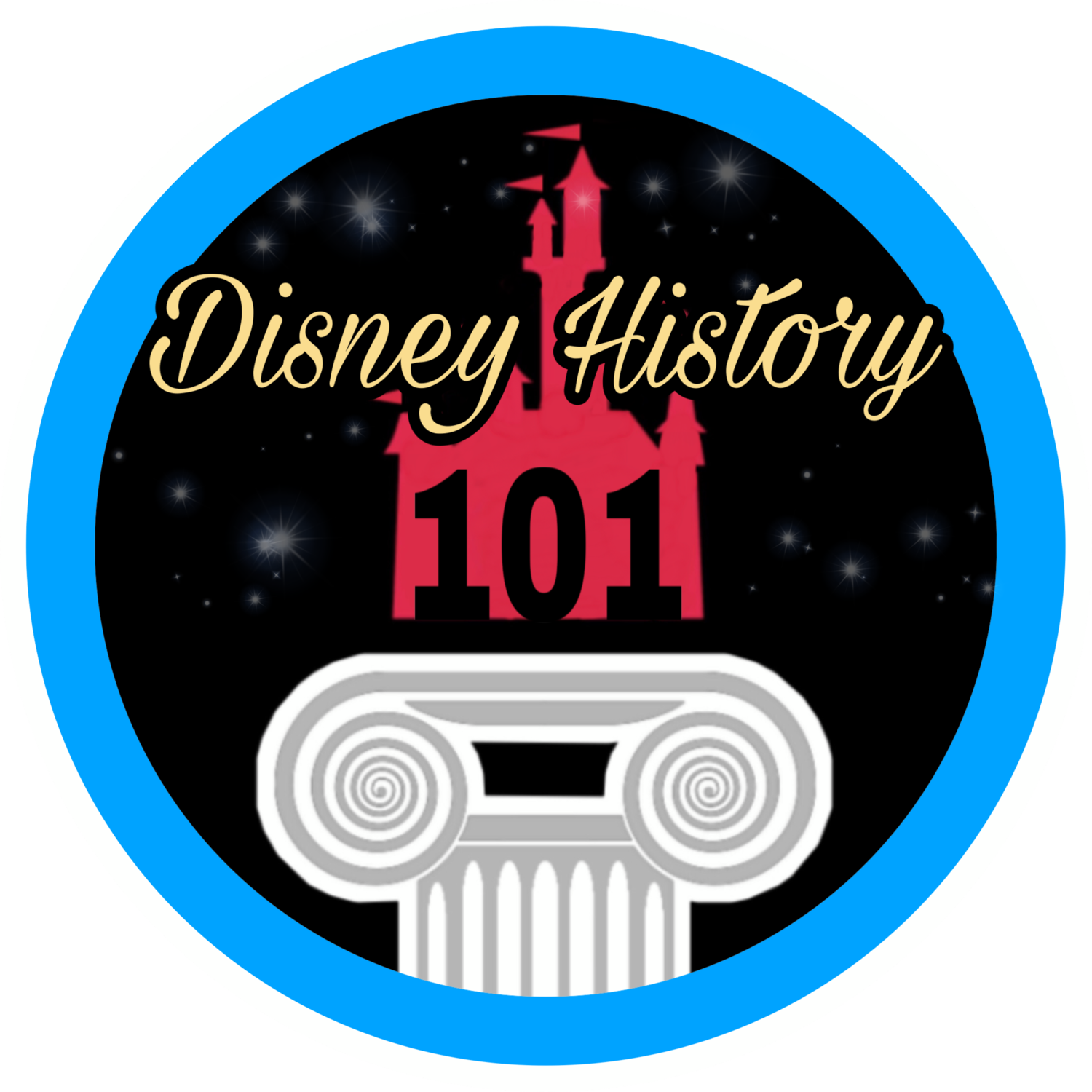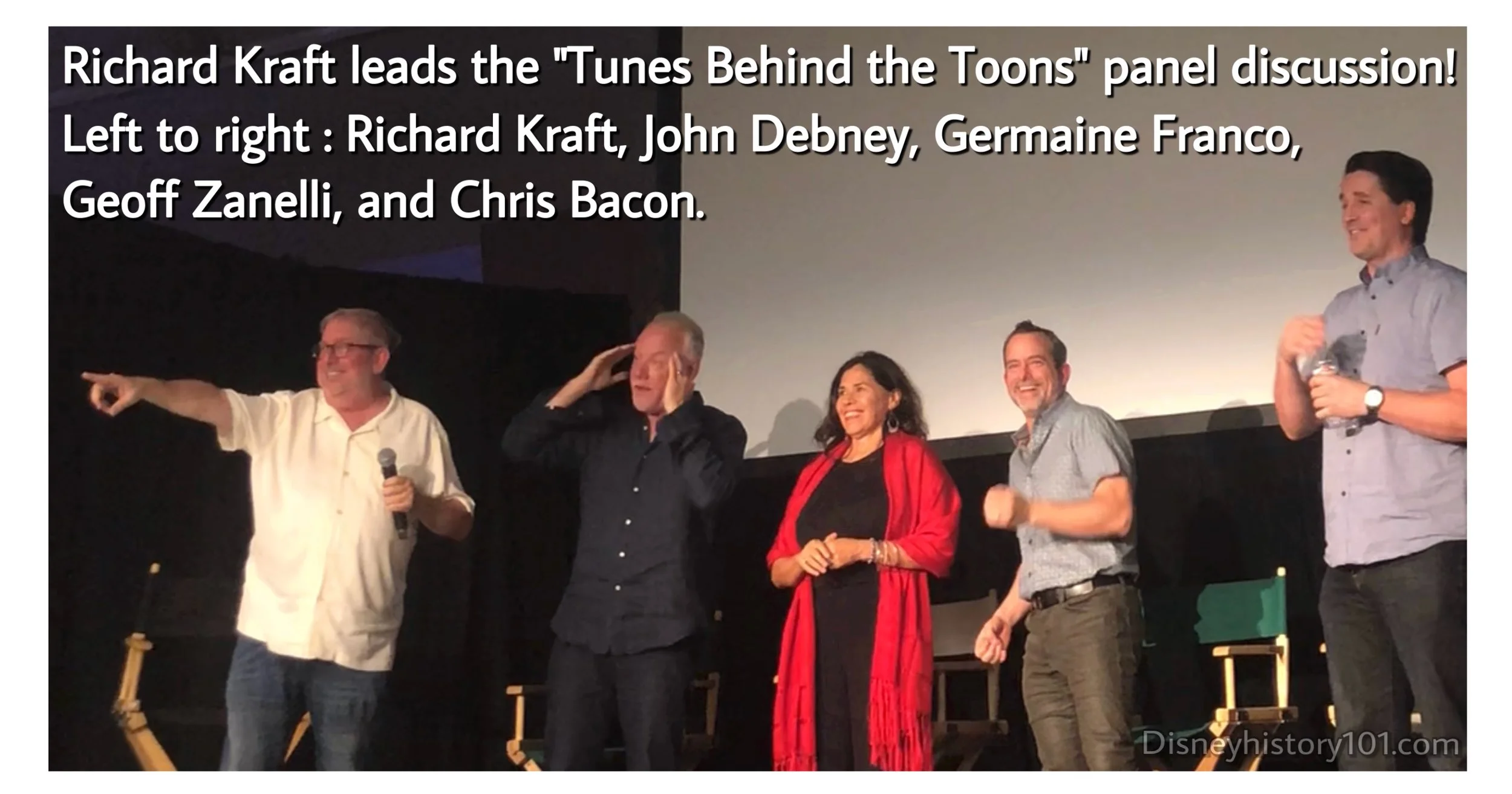Saturday, August 11th, Richard Kraft took opportune advantage of his pop-up exhibit ("That's From Disneyland"), to host a rare screening of Dave Bossert's "The Tunes Behind the Toons".
Dave's 28-minute euphonious documentary takes it's viewers through the process of how music is composed for animation. The film opens during the silent era of theatrically released animated shorts, and their musical accompaniment - whether a lone pianist or a complete orchestra. Next, we explore the early days of Carl Stalling's pre-Warner Brothers contributions toward Walt Disney's Silly Symphonies, and duos like Richard and Robert Sherman or Howard Ashman & Alan Menken whose collaborations produced some of the most memorable music to come out of Walt Disney Animation Studios. The 2013 documentary toured the festival circuit in 2014, but sadly has yet to be publicly released in any format by Walt Disney Animation Studios Special Projects.
"Music itself is a supporting character to the overall film, and in some sense and in some parts of the film it becomes the Lead. It's there to support the action and grab you emotionally." The film "really was a passion project...it was something I really wanted to do, and the Disney Studios allowed me to do it - which was really terrific!", states Bossert. Dave credits the film's materialization to numerous individuals like Ameriacn composer Mark Watters, producer Brian Briskman, and Richard Kraft.
Following the documentary, Richard Kraft conducted a panel discussion - introducing his audience to four diverse orchestral arrangers and writers for Walt Disney Studios' feature films and Disney Parks attractions.
“Now, it’s pretty common to get credit for the works you do. The term ‘ghost writer’ - you can’t apply it anymore, ‘cause we’re not ghosts.”
JOHN DEBNEY
Most of us were already associated with John Debney's wonderful adaptation of George Bruns' score from Walt Disney's 1967 release, The Jungle Book. But there were many new things that were revealed to us about the 62-year old American composer. Richard Kraft relates how John's father, Lou "was the clapper boy for the live-action reference footage on 'Snow White [and the Seven Dwarfs]'. Then, he grew up to become a major producer at Disney...Lou Debney had a young son John Debney (who did not know fully what he wanted to do with life), [so] he brought him to Richard and Robert Sherman's room."
Debney continues, "I think I was about seven. I was really, really shy and I didn't say much. I don't remember what they were working on. But I remember how they were working. One would pound something out on the piano, and then Robert would say, 'No.No.No.' Then they would kind of argue for a little while.'" John didn't know that he wanted to be a film composer at that point, but "after that day I realized that I wanted to do something like they do", recalls Debney.
John remembers what he calls "flashes" of memories from his childhood, spending moments on the Walt Disney Studios Burbank Lot. One particular moment stood out enough to share, about the time when they were shooting the Feduciary Bank sequence for Mary Poppins. "I remember seeing this old, old gentleman (who was Dick Van Dyke in makeup), and...he came over to me and was in character,...and he grabbed my cheek."
When John finished college, he applied for a staff job at Walt Disney Studios, which ultimately led to his first big break - filling in for James Horner and scoring Hocus Pocus, (an experience which he describes as "scoring roughly 80 minutes of music in about two weeks"). John's Disney resume is extensive, yet we were still surprised to find how much music he scored for Disneyland, and other Disney Parks worldwide. He had the privilege to re-record all of the music utilized in Disneyland's New Fantasyland (debuting in 1981). John worked on the score for Phantom Manor at Disneyland Paris, a score which he describes as "reminiscent of Grim Grinning Ghosts". John also rescored Disneyland's Haunted Mansion Holiday tracks to adapt all of Danny Elfman's songs, an addition that has become a seasonal mainstay ever since. While working on the Disneyland 5oth anniversary film, John had an interesting experience. He was scoring music to footage taken in the Golden Horseshoe theatre when (as the camera moves over the crowd's reaction to performers) he noticed a familiar face in the crowd - his father's. He was now scoring a scene featuring his father Lou Debney (a former film composer and conductor for Walt Disney Studios).
GERMAINE FRANCO
It was especially refreshing to meet female composer and song writer Germaine Franco. Franco is most known for her Oscar winning song "Remember Me" ("COCO", 2017), and additional orchestrated music provided for the film. In addition to compositions produced for Pixar and Walt Disney Studios Animation features like Mars Needs Moms (2011) and Toy Story 3 (2010), Germaine has made numerous contributions to Dreamworks' animated feature length films over recent years, and gained more notoriety over her score for DOPE (2015). In fact, Germaine bears the distinction of becoming the first Latina composer invited to join the Academy of Motion Pictures Arts and Sciences' Music Branch.
During the production of COCO, she practically elected to record the music in Mexico rather than use Los Angeles musicians. Germaine humbly shares, "Tom Mac Dougall (who's the executive at Disney Music Animation - he really wanted us to go to Mexico, and so did the film-making team (Lee Unkrich and Adrian Molina). They knew that we could get a great sound here, but they felt that having the real musicians of Mexico (we had fifty musicians) would make a huge difference in the sound."
"I felt like there was such a commitment to the story and how the music moves the story forward. So much collaboration and discussion about that, and the attention to detail in music, but at the same time a vast freedom to 'just write'."
GEOFF ZANELLI
Geoff had recently completed work on Pirates of the Caribbean : Dead Men Tell No Tales, when he was offered another job - twelve days to score Christopher Robin (five of those days were spent with an orchestra in a recording studio). Geoff describes scoring Winnie the Pooh as "a little slower than all the other adorable bears out there. He's all heart. There's a lot of talking even in the movie, and he's a bear of very little brain. But, the point is that he's a bear of very big heart. You have to get into his emotions. It's not a very technical scoring. It's emotional scoring."
CHRIS P. BACON
Richard Kraft introduced Chris Bacon - a composer he met while teaching a class with the film scoring program at USC. Chris went on to score a number of attractions for Disney Parks, like a walkthrough Wonderland attraction for Shanghai Disneyland. This project was challenging, as the attraction featured several zones at which guests move at their own pace. Further, Chris had to adapt Danny Elfman's themes but not in the style they were written for the films.
Chris also contributed scores to Tokyo Disneyland's Jungle Cruise attraction, specifically the Elephant Bathing Pool section. Tokyo's jungle Cruise stands alone, as the only version of the attraction to feature a musical audio track.
On the experience, Chris shares :
"In typical Disney fashion, everything is so carefully laid out for what the experience is going to be - for every inch. Now, something like this a little different, because it's not like some of the linear rides (which can be like scoring a film or a game)...People are going to go at their own pace, so you don't know when they're going to be over it."
Chris remembers fondly riding the Indiana Jones attraction at Disneyland for the first time. "That was the first time I felt like I was riding a movie. I think that has strongly influenced everything they've done since then." Chris is also inspired by other's work, naming Soarin' Over California "one of the best scored attractions." You can listen for Chris' work in the upcoming film HOWARD, a documentary chronicling the life of Broadway and Walt Disney Studio lyricist Howard Ashman, directed by Don Hahn.
On hearing this, Richard then gave a brief interlude, sharing an interesting anecdote in which he revealed the secret origin of Soarin' Over California's score :
"That was written because Jerry Goldsmith (who was my client at the time) got fired from the movie [Disney's] The Kid. He got fired before he started. The settlement I made with Disney was that you have to pay Jerry in full, but he doesn't want to take your money having done no work. So, you can apply half the money you pay him for a future Disney project. James Newton Howard was supposed to score Soarin' Over California, and they called and said, 'What about Jerry?' Jerry and I drove to California Adventure Theme Park (which was a pile of dirt and some buildings). We sat in those chairs and we watched Soarin Over California...Jerry said, "Show it again. Show it again." Then we went to SONY Studios to record the music. You can imagine what a dream this was for me! The great Jerry Goldsmith writing music that will be in the attraction...for eternity."
Fin
By the end of this unique star-studded experience, we feel acquainted with individuals who make invaluable contributions toward the cinematic storytelling process. We absolutely have to thank Richard Kraft and all involved for instilling in us, a far deeper appreciation for every major and minor note within our favorite Walt Disney Studios films & Disney Parks attractions. But even more than that - we now have a greater understanding and appreciation for the hard-working individuals who expend much of their talent, time, and energy to arrange all those notes!







